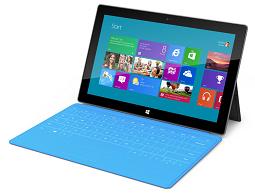Initial thoughts on Microsoft's upcoming Surface Tablets.
Yesterday, Microsoft announced their own branded Tablets but will they be an effective challenger to the iPad?
 Ah, the joy of waking up to an RSS reader full of the aftermath of a typically US-centric product
Ah, the joy of waking up to an RSS reader full of the aftermath of a typically US-centric product launch announcement. 50 people trying to find different ways to say exactly the same thing.
But I don't really care what the tech press says about Microsoft's new tablet offerings. Instead, I am looking at what the mainstream press is saying.
Here's why:
I used to be a very avid Tablet PC user long before the iPad. With all the talk of the iPad creating the tablet market (which, in fairness, it did) many have either forgotten or just straight up don't know about the first incarnation of Windows based Tablet PCs (as opposed to tablets with a small t).
Tablet PCs initially failed due to a few reasons:
- they were not ready
- they were over-priced and under spec'ed
- the marketing was atrocious
Whilst there was massive potential for Tablet PCs there was no escaping the fact that they were running standard Windows with ink support tagged on as an afterthought. This is why Microsoft has gone Metro but creating a schizophrenic environment in Windows 8 is risky.
There was a huge "novelty premium" attached to Tablet PCs which, unfortunately, took them out of the comfortable price range for most consumers. This lead to the situation where they were billed as business devices but the marketing, even when trying to target niches like verticals, was terrible.
So, if Surface Tablets are going to compete with the iPad then the general population is going to have to be exposed in a way that makes them want one.
Confusing?
As Surface Tablets will come in two flavours (with Windows RT on ARM and Windows Pro on x86) they will, no doubt, be targeted at different audiences but the marketing needs to be accurate and unambiguous letting people know exactly what they are getting and what the capabilities of each variant are.
Marketing is key, no only from this perspective but also because of the decision to only sell in Microsoft stores and online. The majority of people are never going to see a Surface Tablet in the flesh and this is going to have a big impact on sales when they can walk in to one of the major stores and try out the offerings from the normal OEMs.
It is also curious that, for something which claims to be an iPad competitor, all of the press shots show it in a PC-like configuration with one of the new keyboard covers. Yes, Microsoft wants to show that the tablets can be used for more than the iPad and are proud of their new covers but it is almost as though they are embarrassed that it is a tablet.
Risky business
The OEMs are probably a big reason why MS has decided to not place Surface in the general retail sphere. OEMs will be sufficiently worried that the company is entering into direct competition as it is.
Microsoft have announced that pricing will be "competitive" with other similar devices and this is a paradox that The company has no way of resolving; there is no way to differentiate on price.
It is said that MS charges up to $85 per Windows RT licence so you would think this would be an ideal opportunity to release a cheap device as the company does not have to pay itself. Unfortunately, you can already hear the lawyers clearing their throats in preparation for the anti-trust case should Microsoft "abuse its position" as the OS manufacturer and unfairly undercut OEMs by a significant margin thus creating a market in which they cannot compete.
It is understandable that Microsoft wants to steal some of Apple's thunder but this is an incredibly risky way of doing it.
What do you think?

For some reason I see this being a big failure because it is such a late entry into the market. Of course I like Apple products so much that I know I'm being really biased here. Time will tell.
We'll see. It all comes down to marketing and the apps.
And I take it the Twitter sign in worked okay ;)